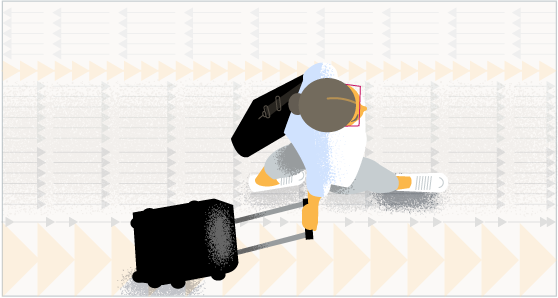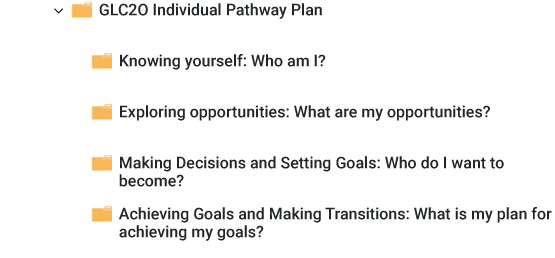Knowing yourself is the beginning of all wisdom.
Welcome to Career Studies, a course literally about you! As you work through the course activities, you will learn about who you are now and who you want to become, including the decisions you will have to make along the way.
What does “knowing yourself” have to do with high school, job searching, or finding a career? A lot actually. Understanding who you are allows you to narrow down your wants and needs in order to find a path in life that is both challenging and rewarding.

Trying to answer big questions like “who are you?”, or “what are you best at?”, or “what do you truly want in life?” can be challenging. Sometimes it makes more sense to start with an end goal in mind.
The future you
Take a few moments now to focus on your future path. You have accomplished a great deal already. But where do you see yourself in 5, 10, or 20 years?
In order to set goals for yourself, you need to dream about where you might like to be. It’s ok if you don’t have all the answers. Many people don’t. But, imagining your possible futures helps you to embrace all of life’s opportunities.

Consider
Close your eyes for a moment and imagine where you would like to be in 5, 10 or 20 years.
- Where, geographically, will you be living?
- What type of housing will you be living in?
- Who will be living with you?
- What type of job will you have?
- How much money will you have?
- What age will you be when you can retire?
- What would you like to be the most proud of?
Write your thoughts in the space provided.
If you don’t know the answer, just put in a rough guess. You may want to provide more than one answer to some of these questions.
Now that you have some ideas about your possible future, you can start to explore how you might get there.
In this activity, you will learn about how the course is organized and some of the strategies that you can use right away to be successful.
How this course is organized
Part of making sure your future goals are achievable means working through a process of career and life planning. This course is structured around four areas of learning outlined in the Education and Career/Life Planning Framework diagram.

This is the Education and Career/Life Planning Framework: A Four-Step Inquiry Process. Which areas of learning are you most comfortable with? Which do you think will be most challenging for you?
In this course, you will track your learning in two ways: in a notebook and in an Individual Pathways Plan. Select the icons to learn more
More about the Individual Pathways Plan – Managing your workload
It is important that you properly manage your work throughout the course and complete the IPP tasks when you encounter them.
Here are some steps that can help make file management easier:
- Create a folder on your computer called GLC2O Individual Pathways Plan;
- Create subfolders for each of the 4 inquiry questions;
- Save any assignments or assessments from this course into the appropriate folder;
- Be sure to give accurate titles to any files you create, so that they can be quickly located for submission later in the course; and
- When required, collect all of the necessary files for submission as part of your Individual Pathway Plan.

Note: You will not be submitting your whole IPP but completing a set of tasks based on the items you have in your IPP. At the end of the course, you will be selecting 8 items from your IPP, and reflecting on your progress and learning. For now, familiarize yourself with the expectations in each section. Each portfolio item is identified by the learning activity where it first appears.
Review the requirements by selecting the four links.
Adapted from Ontario. Ministry of Education. (2013). Creating Pathways to Success. Toronto: Author. Available at www.edu.gov.on.ca/eng/document/policy/cps/CreatingPathwaysSuccess.pdf (Opens in new window).
At the end of each learning activity, you will find a Consolidation section. In this section you will be asked to reflect on both what you are learning and how you are developing as a self-directed learner. In some cases, these reflections will be added to your Individual Pathways Plan. In other cases, you will add your thoughts to your notebook.
This first task is for your notebook. This will be your first entry. Remember to add a date and title for easy reference.
Notebook
The Future Me
At the beginning of the course, you started thinking about the future you 5, 10, or 20 years from now.
For this task, think about the future you at the end of the course.
Write a letter to yourself. Include some of the following details in your letter:
- Why you are taking this course at this time in your life? (or why are you taking this course online?)
- What do you plan on achieving by the end of this course?
- What you are most excited about learning in this course?
- What might you be most proud of at the end of this course?
Give your letter a date and title. It will be interesting to review this letter at the beginning of Unit 3 and see whether your thinking has changed. In the next learning activity you will begin to work on developing your personal profile.


